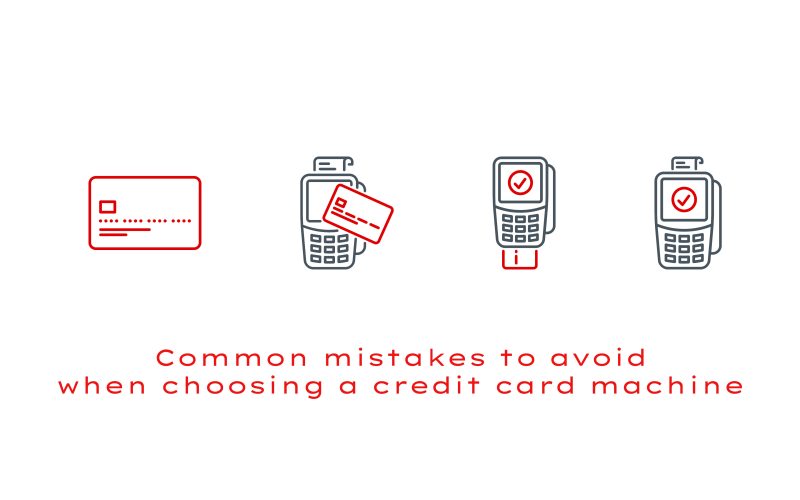A card machine for business, also known as a chip and pin machine or card reader, is exactly what it sounds like. It is possible to make credit card payments using this machine. Generally, card machines can be classified as portable, mobile, or countertops. Here are a few quick notes about each:
- Portable credit card machines allow you to accept payments from customers anywhere you want. Bluetooth technology of portable card machines will let you accept payments regardless of place.
- With mobile machines, you can take card payments on the go anywhere you have a 3G connection, making them ideal for those who travel to see their customers.
- A countertop, as its name implies, is used to take payments from a fixed point, like a till or an office reception desk. You can start accepting card payments as soon as you plug them into your broadband or phone line.
In addition, if you work with the right provider, you will be able to accept contactless payments with any of these types of card machines for business. It’s obvious what they are and why they’re used, but how exactly do they work? Let’s understand the working procedure of a card machine for business step by step.
1. The amount of the payment is entered
Your card machine begins the process by accepting the transaction amount from you, the merchant.
2. Inserting or presenting a credit card by the customer
You can expect your customer to do one of two things if they’re happy with the amount. Those who choose the contactless option will simply tap their card on the machine while those who choose the chip & PIN option will enter their card number into the machine.
3. Interaction between the chip and the machine occurs
Your system communicates with the chip on the customer’s card, which sends encrypted transaction information to your merchant account.
4. A request for authorisation is sent
Following receipt of the data, the acquiring bank sends an authorisation request to the credit card provider, which then asks the customer’s bank for authorisation.
5. Checks for verification have been completed
Upon verifying that the card details are accurate, the card provider will forward the authorisation request to the customer’s bank, which will then confirm that sufficient funds are available.
6. Payment has been sent
Once everything has been authorised, your card machine will notify you that the payment has been successful. Your business bank account will receive the funds in three to five days.
Things to consider before selecting a credit card machine
Choosing the right credit card processor is crucial to the success of your business. Considering the following factors will help you choose the right credit card processor.
Cost
Every business cares about money, but the smallest businesses suffer the most from additional costs and fees. Even though upfront costs vary from processor to processor, the fees associated with credit card processing are usually the most confusing. Initially, you should determine if a payment processor charges a monthly fee or a flat rate per transaction.
There are several arguments in favour of a flat, fixed fee: Without a fixed rate, processors can charge different fees for different types of cards. In addition, most processors differentiate between card-present (CP) and card-not-present (CNP) transactions, regardless of fee structure. By hand-keying a credit card number, a merchant conducts CNP transactions, which are always more costly due to higher fraud risk.
While researching credit card processors, keep an eye on how their fees are structured. Fees associated with compliance, interchange, statement processing, cancellations, and gateway access are among the other processing fees to watch for. Providers don’t always charge fees, and when they do, some aren’t transparent about it, so ask questions. It is also important to consider the cost of equipment. Your business must have at least one latest credit card reader if you intend to process credit card payments in person. Some service providers offer their credit card readers for free, but some charge a fee based on a reader’s capabilities.
Fraud prevention and data security
All businesses must take fraud prevention and security seriously, regardless of size, and fortunately, most payment processors are built with security features. Make sure your processor is PCI-DSS (Payment Card Industry Data Security Standard) compliant, which requires merchants to document, inventory, and safeguard their payment ecosystem. Additionally, it’s important to ensure that the processor provides support and protection for sellers in the event of fraud.
Compatibility with payment methods
Having the ability to accept any payment method your customers use is the best way to future-proof your business. While credit and debit cards remain a popular payment method in the UK, digital wallets, and contactless alternatives such as Apple Pay, and Samsung Pay are growing in popularity. Contactless payments are by default able to accept payments made using cards, phones, and wearables, including Near Field Communication (NFC)-based payments.
Transactions can also be made more secure through contactless payments. As an example, Apple Pay uses the same cryptographic functions as EMV chip cards but uses biometrics to verify cardholder identity. A similar fee is charged for Apple Pay transactions as it is for those made using physical cards, but there is an added level of security.
An interoperable system
Your point-of-sale system should be connected directly to your processing network for ease of use and reporting. In some cases, processors offer POS software that is natively integrated with their systems and hardware, while in others, customers can choose from a network of partners. In deciding which POS software to use, it boils down to your company’s needs and inventory complexity.
In the future, you may want to find a processor that offers more than just processing, such as invoicing, reporting, and accounting. In addition, make sure the processor has a robust partner ecosystem that allows you to easily connect your POS with Shopify, BigCommerce, Intuit, or Xero.
Support for customers
There will inevitably be a time when you need help, so it makes sense to find a processor that offers customer support 24 hours a day, 7 days a week, preferably with direct assistance.
Impact of credit card machine on businesses
We are nearing the end of the reign of cash as king. According to a Federal Reserve study from 2022, consumers use cash for only 20 percent of transactions today. If your business does not accept credit cards, you may be losing out on customers. Credit cards are increasingly becoming the most popular mode of payment.
According to a recent survey by the Federal Reserve Bank of San Francisco, 32% of respondents said they preferred to use a credit card for payment. 57% of total payments in 2021 were made through credit cards and debit cards. In addition to attracting more customers, increasing loyalty, and increasing sales, small businesses can benefit more from accepting credit card payments. Consider accepting credit cards as a payment method for your business if you haven’t already. Taking card payments requires the right card machine for business that meets your needs and those of your customers.
Card payment services are provided by many credit card processors today. But who will be a great partner for your business?
Making the right choice when choosing a credit card processor is almost as important as starting your business. Find out information by checking online reviews, talking to peers, and surfing the internet. It is possible to make the best choice for you, your business, and your customers with a little research.









